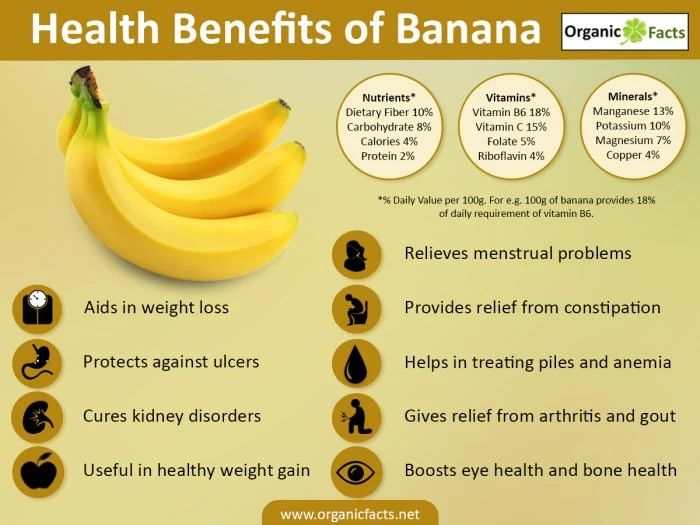As an instant energy booster, bananas are one of the most consumed fruits across the globe. Although varying in color, size, and shape; bananas contain a fair amount of fiber, as well as several antioxidants. From helping lower blood pressure to reducing the risks of cancer and asthma, bananas are known to have a plethora of health benefits (more on this later). Today, bananas are grown in over 100 countries and are ranked 4th among the world’s food crops in monetary value. This article summarizes the potential health benefits of bananas, along with the possible health risks associated with them.
A banana’s nutritive value
An average banana has only 105 calories (approximately) and consists exclusively of water and carbs. Bananas have very little protein and almost no fat. They are a rich source of potassium, vitamin C, vitamin B6, riboflavin, folate, pantothenic acid, and niacin. Bananas also contain other minerals like phosphorus, calcium, manganese, magnesium, and copper.
Why should you include bananas in your diet?

1. Bananas help moderate blood sugar levels and digestive health: Both pectin and resistant starch in a banana is known to moderate blood sugar levels after meals and reduce appetite by slowing down digestion.
2. Bananas are excellent sources of vitamin B6: Vitamin B6 from bananas can be easily absorbed by the body. It aids in the production of red blood cells, metabolization of carbohydrates, fats, and amino acids, removal of unwanted chemicals from the liver and kidneys, and maintenance of a healthy nervous system.
3. Manganese in bananas is good for the skin: A medium-sized banana provides approximately 12% of the daily manganese needs. Manganese helps the body make collagen and protects skin and other cells against free radical damage.
4. Potassium in bananas aids good heart health and helps regulate blood pressure. Bananas are also low in sodium. The low sodium and high potassium combination helps control high blood pressure.
5. Bananas help fight anemia: Thanks to the high iron content in bananas, they are good for those suffering from anemia. Anemia is a condition where the number of red blood cells or hemoglobin in the blood is severely lowered. Anemia leads to fatigue, shortness of breath, and paleness, and bananas are known to help relieve the symptoms.
6. Like most fruits bananas are loaded with vitamin C too: An average banana gives about 10 milligrams of Vitamin C. Vitamin C helps protect against free radicals, which are reactions in the body to the food eaten, cigarette smoke, pesticides, and other potentially harmful things. Vitamin C also helps the immune system work better and helps in the healing process.
7. Bananas help strengthen bones: Bananas help in the absorption of calcium. Calcium is an essential element in the production and regrowth of bone matter in the body. It helps reduce the chances of getting affected by osteoporosis and natural weakness.
What are the possible side effects of eating bananas?
1. High potassium levels: Certain medicines for heart disease and hypertension, like beta-blockers and diuretics, can raise potassium levels in the body. So, those on such medications should consult a doctor before adding bananas to their diet.
2. Allergy: A person can be allergic to bananas, and may experience itching, swelling, hives, and wheezing in the throat and mouth.
3. Unripe bananas: Unripe bananas are known to cause severe indigestion and should be eaten only in a cooked form.
4. Migraine: People suffering from migraines should consult a doctor about the number of bananas they can eat safely.
5. Gastrointestinal distress: Since bananas are high in fiber, eating too many bananas may cause various gastrointestinal disorders including, but not limited to, stomach cramps, bloating, gas, etc.


No comments:
Post a Comment